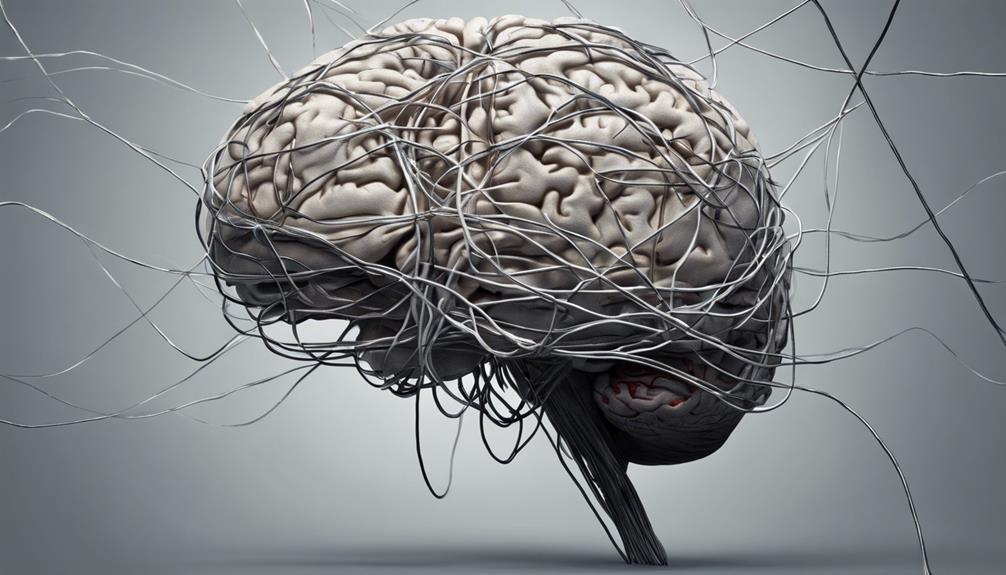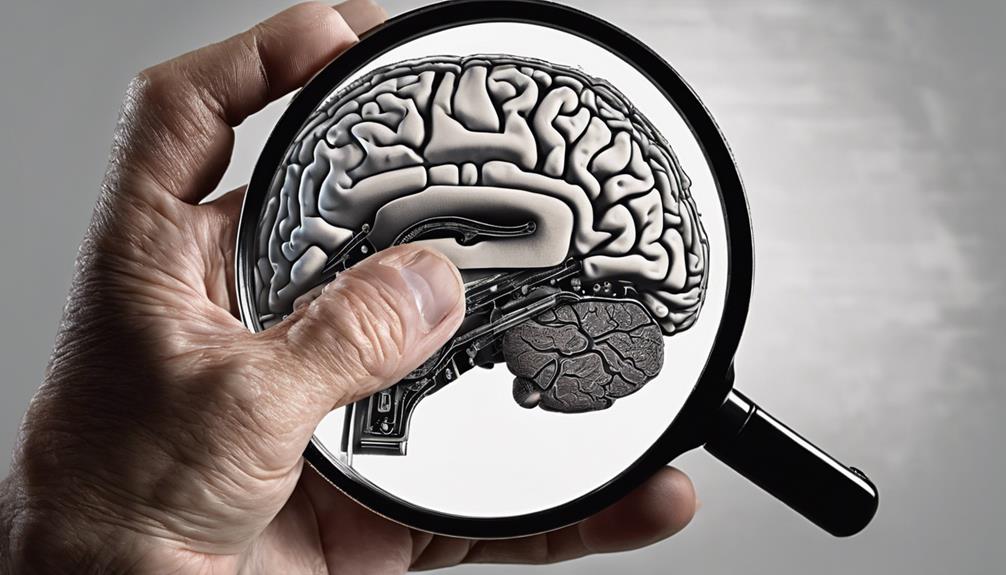Mild Cognitive Impairment (MCI) brings a slight decrease in thinking abilities, affecting memory, language, attention, and decision-making skills. It doesn't disrupt daily tasks to a large extent. You might notice memory issues, trouble recalling information, missing appointments, and behavior changes. Doctors use cognitive tests, brain imaging, and medical history to diagnose MCI. Genetics, lifestyle, and health conditions like diabetes are linked to MCI. Treatment involves cognitive training programs and lifestyle changes. Early action is key to slow cognitive decline. Caregivers help with tasks and support. Learn more about MCI's impact and how to manage it effectively.
Key Takeaways
- Mild Cognitive Impairment (MCI) involves subtle cognitive decline.
- Symptoms include memory, attention, and decision-making difficulties.
- Diagnosis involves cognitive tests, brain imaging, and medical history review.
- Causes include genetics, lifestyle, and health conditions.
- Early intervention, cognitive training, and lifestyle changes are crucial for management.
Definition of Mild Cognitive Impairment
In defining Mild Cognitive Impairment, we encounter a condition marked by a subtle yet detectable decline in cognitive functions that exceeds typical age-related changes. Individuals with MCI may notice difficulties with memory, language, attention, and decision-making skills. While MCI doesn't usually disrupt daily activities greatly, it's important to address it early as it could elevate the risk of developing dementia over time.
To accurately diagnose MCI, healthcare professionals conduct a thorough evaluation, which may include cognitive tests, reviewing medical history, and sometimes brain imaging studies. These assessments help in understanding the extent of cognitive decline and ruling out other potential causes. By undergoing these evaluations, individuals can receive appropriate care and interventions tailored to their specific needs.
If you or someone you know is experiencing challenges with memory or other cognitive functions, seeking a healthcare evaluation is essential. Identifying MCI early allows for timely management and support to help maintain cognitive abilities and overall well-being.
Symptoms and Manifestations

Upon noticing symptoms of mild cognitive impairment (MCI), individuals may observe forgetfulness, difficulty recalling information, missing appointments, and trouble following conversations. Additionally, those with MCI might experience feelings of depression, anxiety, or changes in behavior.
MCI can affect different aspects of cognitive function, such as memory problems (amnestic symptoms) or other cognitive abilities like reasoning and judgment (nonamnestic symptoms). In the brain, MCI can be linked to the presence of plaques, tau proteins, Lewy bodies, and reduced blood flow, which can contribute to the observed symptoms.
Family members and friends may notice shifts in behavior, mood, or cognitive abilities, signaling the presence of MCI. Understanding these manifestations can help individuals seek timely support and interventions to manage cognitive changes and improve overall well-being.
If you or someone you know is experiencing these symptoms, seeking guidance from healthcare professionals is essential for accurate diagnosis and appropriate management strategies.
Diagnostic Procedures and Tests
When evaluating mild cognitive impairment (MCI), healthcare professionals typically employ diagnostic procedures such as cognitive tests, brain imaging studies, and a review of medical history. These tests help in evaluating memory, thinking abilities, and identifying any underlying causes of cognitive decline. Biomarkers, like abnormal brain PET scans, can provide valuable information, especially in cases related to Alzheimer's disease. Neuropsychological testing may also be recommended to further understand cognitive functions when the presentation is unclear. Neurologists, specialized in brain and nervous system disorders, play an important role in diagnosing memory disorders and guiding treatment plans for MCI. Additionally, regular follow-ups with healthcare providers every six months are essential for monitoring changes in memory and cognitive function associated with MCI.
| Diagnostic Procedures | Description | Importance |
|---|---|---|
| Cognitive tests | Evaluate memory, attention, and problem-solving skills to assess cognitive function. | Essential for understanding abilities |
| Brain imaging studies | Utilize imaging techniques like MRI or CT scans to visualize brain structures and detect any abnormalities. | Aid in identifying structural changes |
| Medical history review | Review past medical records to identify any patterns of cognitive decline, underlying conditions, or medications that could affect cognition. | Provides insights into potential causes |
Underlying Causes and Risk Factors

Understanding the underlying causes and risk factors associated with mild cognitive impairment is essential for effectively addressing and managing this condition. Mild cognitive impairment (MCI) can arise from various factors, including genetics, lifestyle choices, and underlying health conditions.
Genetic factors, like the APOE e4 gene, can increase the risk of developing MCI. Conditions such as diabetes, depression, high blood pressure, and stroke can also play a role in the likelihood of experiencing MCI. Lifestyle choices like smoking, excessive alcohol consumption, poor diet, and lack of physical activity have been linked to a higher risk of mild cognitive impairment.
Taking steps to manage cardiovascular health, engaging in regular exercise, and maintaining social connections can help reduce the risk of developing MCI. By understanding these underlying causes and risk factors, individuals can make informed decisions to potentially lower their risk of developing mild cognitive impairment and improve their overall brain health.
Treatment Approaches and Options
When it comes to addressing Mild Cognitive Impairment (MCI), we've several effective treatment options at our disposal.
These include medications specifically designed for MCI, engaging in cognitive training programs to exercise the brain, and making lifestyle modifications such as incorporating physical exercise and social activities.
Medication for MCI
Limited medication options are available for managing Mild Cognitive Impairment (MCI), as specific drugs haven't been approved by the FDA for treatment. When contemplating medication for MCI, it's vital to consult with a healthcare provider to evaluate the potential risks and benefits.
Here are some key points to ponder:
- Some off-label medications may be prescribed to manage MCI symptoms, but their effectiveness is uncertain.
- Ongoing research aims to develop drugs targeting underlying causes like Alzheimer's disease pathology.
- Non-medication approaches such as lifestyle modifications, cognitive training, and social engagement are commonly recommended.
- Discussing treatment options thoroughly with a healthcare provider is essential.
Cognitive Training Programs
Exploring cognitive training programs as a non-medication approach for managing Mild Cognitive Impairment can offer targeted interventions to enhance cognitive function and overall quality of life. These programs aim to improve memory, attention, and problem-solving skills while enhancing cognitive function. Structured exercises, puzzles, and mental challenges are commonly used to stimulate the brain and combat cognitive decline.
Research indicates that participating in cognitive training can enhance cognitive performance and potentially slow down the progression of MCI. These programs are personalized, adaptive, and progressive to cater to individual needs. Engaging in cognitive training not only improves cognitive abilities but also boosts independence and confidence in managing challenges associated with MCI, ultimately enhancing overall quality of life.
Lifestyle Modifications
To enhance cognitive function and overall brain health in individuals with Mild Cognitive Impairment, incorporating lifestyle modifications such as regular physical exercise, mental stimulation activities, and a healthy diet is essential. These changes can help slow down cognitive decline and improve quality of life.
Here are some key lifestyle modifications to contemplate:
- Engage in regular physical exercise to support cognitive function.
- Participate in mental stimulation activities like puzzles or learning new skills.
- Maintain a healthy diet rich in fruits, vegetables, and omega-3 fatty acids.
- Foster social engagement and strong social connections for emotional and cognitive support.
- Avoid smoking, excessive alcohol consumption, and manage stress levels to help manage symptoms and prevent further cognitive decline.
Importance of Early Intervention

Early intervention is essential in the management of Mild Cognitive Impairment (MCI) to slow down cognitive decline and enhance quality of life. Research shows that addressing MCI in its early stages can have a substantial impact on the progression to dementia.
Engaging in mental exercises, such as puzzles or learning new skills, is vital for keeping the brain active. Maintaining a healthy lifestyle through regular exercise and a balanced diet can also support cognitive health. Seeking medical advice promptly allows for the development of tailored treatment plans and access to support services.
These interventions can lead to better outcomes for individuals with MCI, potentially delaying the need for advanced care. By recognizing the importance of early intervention and taking proactive steps, individuals can empower themselves to manage MCI effectively and improve their overall well-being.
Lifestyle Modifications and Prevention

First and foremost, it's essential to understand that consuming a nutritious diet filled with fruits, vegetables, and whole grains is key to safeguarding our brain health.
Next, participating in regular physical activity, such as walking or swimming, can notably reduce the risk of developing Mild Cognitive Impairment.
Healthy Diet Importance
Incorporating a healthy diet rich in essential nutrients is important for supporting brain health and potentially reducing the risk of mild cognitive impairment (MCI).
To promote cognitive function and brain health, consider the following:
- Consuming foods high in antioxidants like berries can help protect against cognitive decline.
- Including omega-3 fatty acids from sources like fish supports brain health and memory retention.
- Vitamins such as B12 and folate are necessary for cognitive function and may aid in preventing MCI.
- Avoiding processed foods and excessive sugar can reduce inflammation linked to cognitive impairment.
- Incorporating leafy greens into meals can provide essential nutrients for brain health and potentially mitigate the risk of developing MCI.
Regular Exercise Benefits
Regular exercise plays an essential role in reducing the risk of developing mild cognitive impairment (MCI) and improving cognitive function. Engaging in activities like aerobic exercises or strength training can enhance brain health, memory, and overall well-being.
Studies have shown that physical activity not only helps in reducing the risk of MCI but also slows down cognitive decline associated with the condition. By maintaining an active lifestyle through regular exercise, individuals can potentially delay the progression of MCI to dementia.
Incorporating regular exercise into daily routines is vital for promoting brain health and cognitive function. Remember, staying active through physical activities is a proactive step in maintaining cognitive abilities and delaying the progression of mild cognitive impairment.
Cognitive Activities Engagement
Engaging in cognitive activities like puzzles, reading, and learning new skills contributes greatly to maintaining brain health and reducing the risk of cognitive decline. To enhance brain function and build cognitive resilience, consider the following lifestyle modifications and prevention strategies:
- Regularly challenge your brain with puzzles, crosswords, or Sudoku.
- Engage in activities that require learning new information or skills.
- Participate in social interactions to stimulate cognitive function.
- Explore hobbies that involve problem-solving and critical thinking.
- Pursue lifelong learning through educational pursuits or workshops.
Impact on Daily Functioning

How does Mild Cognitive Impairment (MCI) impact daily functioning? Individuals with MCI may face challenges in tasks requiring essential cognitive functions, like managing finances or planning schedules. While basic daily activities such as self-care and household chores may remain manageable, more complex activities could be affected. This impact varies among individuals, with some needing minimal assistance and others requiring more support, especially in areas like medication management. The cognitive difficulties associated with MCI, such as memory lapses and decision-making issues, can influence work performance, social interactions, and overall quality of life.
To cope with these challenges, using memory aids, setting reminders, establishing routines, and seeking support from family or caregivers can be beneficial. By incorporating these strategies, individuals with MCI can navigate daily tasks effectively and maintain a sense of independence. Understanding how MCI affects daily functioning is vital in providing the necessary assistance and support to enhance the quality of life for those experiencing this condition.
Caregiving Strategies and Support

In providing care for individuals with Mild Cognitive Impairment (MCI), support with daily tasks like medication management and appointment reminders is vital. Engaging in meaningful activities such as puzzles, games, and hobbies can help stimulate cognitive function in individuals with MCI.
Creating a structured routine and environment can aid in reducing confusion and anxiety for those with MCI. Joining support groups or seeking counseling can provide emotional support and practical advice for caregivers of individuals with MCI.
Respite care services can offer temporary relief for caregivers, allowing them to rest and recharge while ensuring their loved one's needs are met. Remember, incorporating these strategies can help improve the overall well-being of both the caregiver and the individual with MCI.
Frequently Asked Questions
How Quickly Does Mild Cognitive Impairment Progress?
We can't predict exactly how quickly mild cognitive impairment progresses for everyone. Factors like age and overall health play a role. Regular monitoring and healthy choices can help manage it. Let's work together to understand and address concerns.
Can You Still Work With Mild Cognitive Impairment?
Yes, we can still work with mild cognitive impairment. Accommodating work environments, communication with employers, and seeking professional support are crucial. Legal protections like the ADA can provide assistance. With these strategies, we can remain productive at work.
How Do You Deal With Someone With Mild Cognitive Impairment?
We deal with someone with mild cognitive impairment by offering clear instructions, utilizing memory aids, maintaining routines, engaging in cognitive activities, and showing patience and empathy in communication. These actions help support individuals in their daily tasks and interactions. Additionally, it is important to monitor any physical health conditions that may arise, as these can impact cognitive functioning. For instance, ensuring the individual has access to wolffparkinsonwhite syndrome information could be critical if they are at risk for or diagnosed with this condition, as managing both cognitive and physical health is essential for their overall well-being. Regular check-ins and collaborating with healthcare professionals can also provide the necessary support to individuals with mild cognitive impairment. Incorporating a *wolffparkinsonwhite syndrome overview* into discussions with caregivers and healthcare providers can be helpful in understanding the relationship between the syndrome and cognitive health. By staying informed about both cognitive and physical conditions, caregivers can adopt a more holistic approach to care, ultimately leading to better health outcomes for the individual. Regular evaluations and adapting care strategies based on changes in symptoms are also key to ensuring their well-being.
Can You Live a Normal Life With Mild Cognitive Impairment?
We believe that living a normal life with mild cognitive impairment is possible with the right support. By making lifestyle adjustments, seeking medical advice, staying socially engaged, and staying positive, individuals can maintain a fulfilling life despite the challenges.
Conclusion
To sum up, understanding mild cognitive impairment is like peeling back layers of an onion – it requires patience and careful attention to detail. By acknowledging the symptoms, seeking early diagnosis, and exploring treatment options, individuals can enhance their quality of life and maintain independence.
Caregivers play a vital role in providing support and assistance to those with MCI. Remember, knowledge is power when it comes to managing cognitive health and overall well-being.








